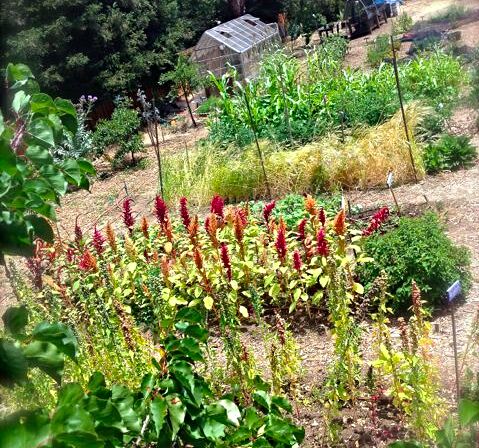Common Ground Garden Mini-Farm Report
By Paul Higgins PhD, Common Ground Garden Manager

Common Ground's Educational Garden in Palo Alto, CA
PHOTO CREDIT: COMMON GROUND STAFF
Transition is the word that comes to mind when I walk through the garden presently. We are in a season of transition, as the California Spring in the Bay Area is half-way between the mud of winter and the parched clay of summer. The early spring fruit-tree blossoms on our twenty or so trees have all but fallen off, revealing the beginnings of tiny apricots (the garden used to be an orchard), nectarines, pluots, apriums, mulberries, and elderberries.
Mia, our Education Program Manager, has transitioned to a new job, and we were lucky to have Zuzanna Drozdz take her place while we looked for a new person to come on board, permanently. Zuzanna actually started the education program at Common Ground Garden several years ago.
As a project, we are also trying to transition to a state of sustainability in every aspect. We were fortunate to receive a Palo Alto Holiday Fund Grant of $5,000 that we will mainly use to build gopher and squirrel cages to protect some of our beds. Last year we barely managed to get any wheat or corn harvested because of these pests. One thing you notice about farming in a suburban setting is that it is ecologically imbalanced. The squirrel population runs amok here, with no bobcats or coyotes to keep their numbers down.
We have been harvesting many of our winter and early spring crops in advance of the squirrels' return, including parsnips, hard red winter wheat, barley, Chinese celery, golden peas, sweet red bunching onions, tree collards, sprouting broccoli, leeks, lettuce, and kale. We are awaiting a new crop of peas and have just transplanted some rattlesnake beans. This time we are using a natural pea trellis (oak branches with leaves removed) and bean pole (long oak poles, stripped of side branches).
Of course, we don't get all this done alone, we have a thriving volunteer program. Lately we've had a number of Youth Community Service groups come to help us, as well as Stanford University and Google employees. For two hours every Wednesday, we host an open volunteer day, which is a great opportunity to teach the community how to grow their own food Biointensively. The session culminates in a potluck over which we share gardening tips and enjoy a fresh salad from whatever is ready to harvest. Daily volunteer waterers and weekly weeders keep the garden alive and thriving. Not to mention, the students in our schools program often help us dig beds and plant potatoes and other crops. Of course food isn't all we grow...
After 10 years of gardening in Palo Alto, we have created an important niche in the community!
top | Newsletter Home | Article Index | Archive

|



